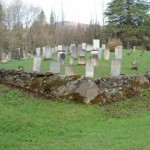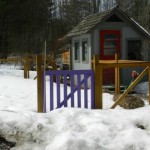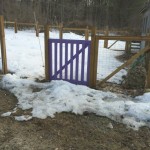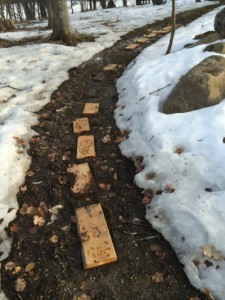 Here’s Spring Came Late, Part Two – an excerpt from my not-yet-published novel Elegy for a Girl, a heartbreaking love story between Mary Grace “Girl” Knight and her father, Harlan, whose hill-farm is bisected by construction of the new interstate highway in 1958.
Here’s Spring Came Late, Part Two – an excerpt from my not-yet-published novel Elegy for a Girl, a heartbreaking love story between Mary Grace “Girl” Knight and her father, Harlan, whose hill-farm is bisected by construction of the new interstate highway in 1958.
Spring continues to progress slowly in Vermont this year. The front door is still blocked by snow off the roof, and the field is still covered, but with only a veneer of snow that’s shrinking away from the edges. The mud is a welcome sign of thaw.



Spring Came Late, Part Two – from Elegy for a Girl
(For those who missed it, here’s a link to Part One.)
March stuttered into April. A heavy wet snow threatened to snap the newly pruned apples. The branches sagged. Harlan tramped down to the orchard with a broom to sweep the damp slush from each limb. As soon as he cleared the snow, the branches sprang up.
Warm days returned, and Harlan gathered more sap. This run was darker and better tasting, though it didn’t fetch as high a price.
As cold as the nights were, the days were that much warmer, and the snow kept receding like an ebbing tide, leaving a high water mark of decayed leaves, ridges of sand, and long lines of abandoned pebbles. The leaf-littered margins of barren ground along the roadsides widened, as did the islands of earth emerging on the south facing pastures. The lacy, thinning edge of snow shrank, just like foaming surf at the shore.
Robins returned to the hard ground; the chickens resumed laying; one hen turned broody. Ants showed up in the kitchen. Girl continued tired, and cold.
She sat by the fire between necessary movement, huddled around a mug of hot milk, or sometimes hot water. Every time she stepped outside, she returned chilled. Not even the sunshine lured her, cut as it was by a cold wind. And she was too tired to hear the water cascading down through the woods.
Spring came late. Snow squalls frosted the forsythia when it finally bloomed.
Spring came late, and for many weeks the yellow branches of the willow hung like frayed laundry, offering the only hint of color against a lowering gray sky.
Spring came late, and when the wind blew, those yellow wands of willow thrashed against a cold sky. In the orchard, the trees held tight to their buds, like fists wrapped around gemstones, withholding, withholding.
Spring came late, and Harlan sugared well into April, counting each can of syrup like money in the bank, to pay taxes, buy seed. Next year, he planned to save seed: golden kernels tucked away in a secret cache, like bullion buried in the root cellar.
Spring came late, and Harlan poured molasses on old hay, to sweeten the cow’s feed. He had to buy oats for the horses. It would be late May before there was decent pasture, spring was so late.
Girl watched the world from her kitchen window. Each day held its misery of secrets and silence so bitter a lemon would have tasted better. She craved lemons, or grapefruit. Longed for early greens.
Harlan told her to hunt fiddleheads. She climbed into the wind, down to the stream tumbling over the rocks where she pinched the scrolled ferns erupting from the brown earth. Her fingers turned raw. She scrambled back, up through the orchard, under the clothesline, through the blueberry hedge. The wind pushed her forward, and she stumbled over the turned earth of the kitchen garden Harlan had disked, he having more faith the seasons would turn.
For all that effort, when she boiled the ferns, she couldn’t stomach them. They tasted green, and she threw up.
Spring came late and Girl felt sick, vomiting yellow bile most mornings, unable to eat until noon, and then gorging on eggs, craving the bright orange yolks that she sopped up with toast. After feeding Harlan dinner, she’d stand at the cookstove and fry one egg after another, eating three, sometimes five right from the pan. She didn’t really know what was happening and lived in the shadows of the walls, afraid to look at her father. They’d stopped talking again.
One day the wind complained through the clapboards, and Girl took her restlessness outside, across the soggy fields that were still the color of dull straw. She pulled her kerchief tighter under her chin and bent towards the highway.
The snow had melted, leaving two great muddy cuts, like newly ploughed furrows in a giant’s garden. The turned earth crawled with yellow-headed beetles: hard-hatted men carrying yellow-legged scopes up and down the seedbeds of the thruway. At varying intervals, a pair would stop. One would set up a tripod and squint and wave at his partner who wrote numbers in black marker on a yellow-tipped stake, then planted it. Girl saw a long line of such stakes marching up what looked like the middle of the road.
None of the men looked like Eugene, but they were too far away for her to be sure, and too engrossed in their work to notice her standing on the cliff in her drab clothes. Despite pockets of snow still cradled in cool crannies of north-facing rock, winter was losing its grip. The daffodil stakes blooming in the highway reassured her more than any amount of water seeping into the ground, more even than the delicious odor of mud, that the men were back at work. Eugene would be back, too.
Girl turned into the wind and pushed her way home. Nearly doubled over with the effort, her eyes followed her sturdy shoes crossing the dreary ground, so she didn’t see his car until she was already in the dooryard. She tightened the kerchief under her chin.
As she approached the house, the kitchen door opened, and Eugene stepped out. Harlan shook his hand when it was offered, then he turned down the steps. He just nodded at her as he crossed toward his car. She stood dumb as he started the engine, backed the car and turned down the lane. She stood and listened to the tires on the gravel, saw the brake lights burn red at the end of the lane and listened to the sound of Eugene driving away.
Harlan turned back into the house. When the door closed something inside Girl broke. Hot blood rose from her toes until even her fingers tingled. She burst into the kitchen and shouted, “What was he doing here?”
Harlan straightened and shuffled some papers on the table.
“What did he want?” She stood with her fists on her hips. Harlan looked from his daughter to the papers to his daughter again. She could see him slowly gathering his words. She stamped her foot. “What did he want?”
His face focused. “What’s your fury?”
They faced each other a moment.
“He came to buy that gravel, is all.” Harlan held the papers up, as if their mere presence explained everything.
“What?”
“He needs gravel.” Harlan’s voice slipped into the warm tones he used on the cows. “He needs gravel to build his superhighway, and there’s a small mountain of it on land he didn’t buy.” Harlan stood up. “He ain’t buying this land, neither. Just the gravel out of it.” He looked down at the papers. “Gonna pay for it, too.” His voice dropped to a near whisper. “He’s gonna pay.”
Girl shrank, unwilling to examine her disappointment, but she couldn’t help smelling its stink. Without even taking off her coat, she retreated upstairs.
In front of her small mirror, she pulled the scarf from her head and stared. She didn’t see her green eyes or the curve of her brow, didn’t see the jaw line or cheekbones that gave her face its clear shape. She didn’t see the tangle of her greasy hair, gone wispy with neglect, nor did she see the waxy dirt that covered her skin, the grubby crease lines circling her neck. She stood and stared in the mirror and saw nothing at all of herself. Only Eugene walking past her without recognition, not so much as a smile or secret wave. She saw that sequence of his descending the steps and opening his car door again and again while she stared at her invisible reflection. When her mind finally tired of watching Eugene walk past her, it focused on the mirror, but she saw nothing there.
The next day, and the next and the next, Girl edged her way around the kitchen, even when Harlan was out of the room. She climbed the stairs with her shoulder against the wall, and she avoided the parlor completely. In her narrow bed, she hugged herself into a corner. Even though she spent much of her day curled there, she was always tired, and no matter how much time she crouched in the shadows, she saw herself like a mouse exposed in a vast field of linoleum with no hope of cover.
A few days later, Harlan thundered up from the basement and heaved a bushel of potatoes in the middle of the kitchen floor. The thump startled Girl, as if the dirt splaying onto the floor were her nerves. She steadied herself by grasping the edge of the cool, porcelain sink.
“I’ll be digging trenches. I want you to sort the potatoes. Those fit for eating, set aside. Those that have sprouted, we’ll use them for seed.” He regarded her back and sighed. “Cut them so each piece of seed has two eyes.” He waited. “Do you hear me?” His voice rose somewhat.
Girl nodded, once, without turning.
“Goddamit, Girl. Can’t you talk?”
Girl shook her head slowly, once, side to side.
“What’s done is done!” He stormed out.
Girl stood at the sink, her dry eyes unblinking.
When she finished sorting the potatoes she buttoned a jacket against the raw weather and pushed herself into the damp wind, hauling the basket of seed stock on her hip.
Harlan’s jacket hung on a fence post. He was bent over a shovel, working with the method of a machine, more than halfway down the second trench. He didn’t stop until he finished the row.
Girl waited, the wind tugging at the scarf she’d wrapped around her head. She saw the dark stain of sweat on the back of his shirt, hugged her jacket closer and shivered while he leaned on his shovel and wiped his sleeve across his brow. He pulled a bandanna from his pocket and mopped the back of his neck.
They eyed one another. Girl looked away first, towards the end of the row. She stood resolute, face into the wind.
Harlan trudged across the soft earth. “Is that all the seed potatoes?” He peered over the edge of the basket. Girl unhooked her arm and placed the basket on the ground, keeping her body a quarter turn from his. “We’ll have to use some of the others. We’ll need enough for four rows.”
Girl stood, unmoving.
“Plant what you have there to start with. One potato every ten inches.”
Harlan planted his shovel at the top of the third row and dug away from his daughter.
The chill wind wormed through her wool jacket so that it felt better to move than stand like a stone, and Girl bent to her labor, placing each blind seed into earth colder than the wind. She pushed a palmful of the brown dirt over each planted potato and saw again Pumpkin’s drowned eyes staring dumbly at the gray-sided pail. The earth she pulled over the potatoes was the same color as the water in the pond, maybe richer, denser, more deadly. Every ten inches she buried a spud. Every ten inches she regarded the long trench before her and ached to lay herself down the length of it, bury herself in the damp earth that smelled like spring and all the misery of grief everlasting.
Girl worked her way down the row, dragging the basket beside her, kneeling at the edge of the trench, watching her own hands work as if they were someone else’s, not seeing what she was doing but seeing the men sink the yellow stakes into the long furrows of highway. Dirt filled the creases in her palms, and she could hardly bend her fingers for the cold.
I think I want to read more……..great writing
Thanks!
I think it’s a courageous book and that it’s a pity it sits in a drawer.
Agreed. Thanks for your vote of confidence.